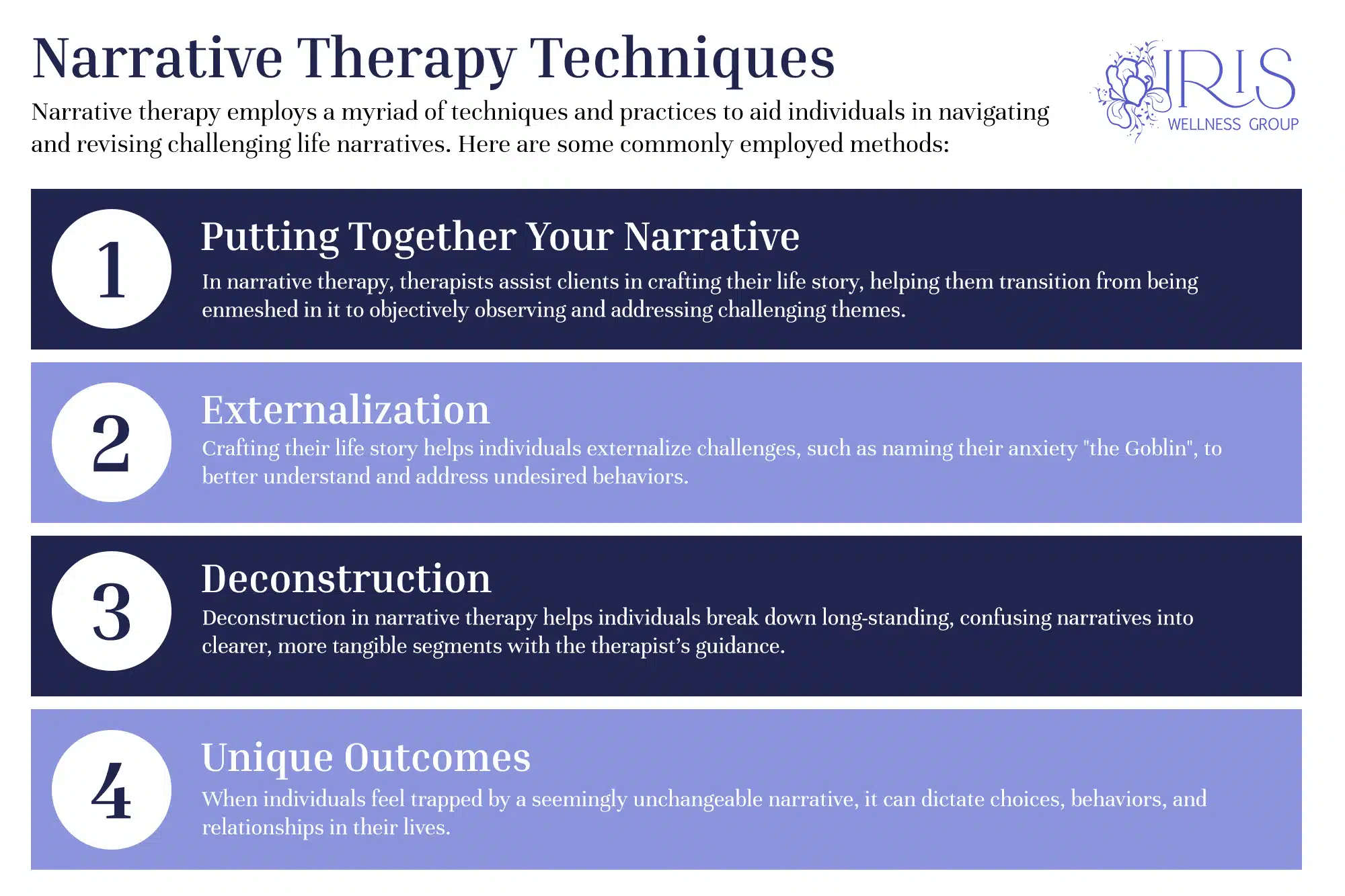Table of Contents
What is Narrative Therapy?
Narrative therapy offers a unique perspective on counseling by considering individuals as distinct from their challenges and negative habits. It enables clients to take a step back and evaluate whether certain behaviors, which may seem destructive, are in fact protective in some way. By adopting this viewpoint, individuals are more equipped to modify their thought processes and actions, and consequently, “reauthor” their life narratives. This new story better aligns with their true self, potential, and life’s mission, without being overshadowed by issues.
Introduced in the 1980s by Michael White and David Epston, this therapy emphasizes the importance of not self-labeling as “bad” due to mistakes. Instead, it promotes self-compassion and refrains from internalizing blame or judgment. A well-constructed narrative aids individuals in understanding and articulating their experiences. As stated in The Sage Encyclopedia of Theory in Counseling and Psychology, this therapeutic approach proves beneficial for many.
Key elements of narrative therapy include:
- Dissecting dominant or problematic narratives to understand them better.
- Fragmenting these narratives to make them easier to address.
- Reframing and reshaping these dominant narratives.
- Expanding one’s perspective to embrace healthier narratives, a technique known as ‘unique outcomes’, enhancing understanding of feelings and incidents.
- Recognizing that a narrative’s truth might differ from one individual to another.
- Separating oneself from the problem, reinforcing the belief that one is not defined by their issues.
- A well-structured narrative not only provides clarity but also instills a sense of purpose and meaning.

Narrative Therapy Techniques
Narrative therapy employs a myriad of techniques and practices to aid individuals in navigating and revising challenging life narratives. Here are some commonly employed methods:
Putting Together Your Narrative
In narrative therapy, therapists guide their clients in constructing their life story. This endeavor empowers individuals to rediscover their voice and reflect upon significant life events and the interpretations they’ve attributed to them. As they weave their narrative, they transition from being enmeshed in their story to observing it alongside the therapist, pinpointing any dominating or troublesome threads within.
Externalization
Creating one’s life story allows individuals to see themselves from an external perspective. This technique, known as externalization, fosters a separation between the individual and their challenges, enabling them to focus on modifying undesired behaviors. For instance, a person might label their anxiety as “the Goblin”, describing to the therapist the sensations they experience in its presence and their coping strategies.
Deconstruction
The deconstruction technique aids individuals in achieving clarity in their narratives. When a problematic narrative feels long-standing, individuals might resort to sweeping statements, becoming entangled in their own tales. Here, the therapist collaborates with the person to dissect their narrative into more digestible segments, illuminating the issue and making it more tangible.
Unique Outcomes
When a narrative seems fixed and unchangeable, the notion of alternative narratives might seem improbable. Individuals can feel trapped within their narratives, letting them dictate numerous facets of their lives, influencing choices, behaviors, experiences, and interpersonal relationships.
How Can Narrative Therapy Help You?
Though narrative therapy is a relatively modern therapeutic method, emerging research suggests its potential benefits for a range of issues. Some mental health challenges where it may offer relief include:
- Anxiety
- Attachment concerns
- Attention-deficit/hyperactivity disorder (ADHD)
- Depression
- Eating disorders
- Grieving processes
- Post-traumatic stress disorder (PTSD)
Furthermore, narrative therapy can be beneficial for those feeling inundated by adverse events, thoughts, or feelings. Central to this therapy is the idea that individuals shouldn’t perceive themselves as “flawed” or “the issue” nor should they feel trapped by their situations and behavioral tendencies.
What to Expect During Narrative Therapy
Your therapist will prompt you to steer the discussion, inquiring about your preferred topics and routinely verifying if the subject, often a challenge, remains relevant to you. Over time, they’ll guide you to share uplifting stories from your past, unveiling innate qualities and talents that can be harnessed to tackle your issues. The aim is to help you recognize the constructive and beneficial ways to shape your life and future without being defined by your challenges.

Benefits of Narrative Therapy
Narrative therapy is rooted in several foundational principles:
- Empathy and Respect: Participants in narrative therapy are valued and acknowledged for the courage they demonstrate in confronting and addressing their personal challenges.
- Non-Judgmental Approach: As individuals navigate through their stories, they aren’t subjected to blame. They are also motivated to avoid casting blame on others. The emphasis is on discerning and amending counterproductive narratives about oneself and others.
- Empowering the Client: Narrative therapists don’t assume a directive, advice-giving role. Instead, they position themselves as allies in the client’s journey towards growth and healing. The therapy reinforces the idea that clients have a deep understanding of their own lives, and delving into this knowledge can lead to a transformation in their stories.
The essence of narrative therapy is to confront and reframe dominant narratives that may hinder individuals from realizing their fullest potential. Through this therapeutic approach, individuals can unearth alternative narratives, broaden their self-perception, challenge longstanding and detrimental beliefs, and embrace fresh perspectives that resonate with a truer, healthier narrative of their lives.
Rather than attempting to alter an individual, narrative therapy empowers them to become the primary author of their life’s story.
How is Narrative Therapy Used?
Narrative therapy can be a valuable tool for individuals, couples, and families alike. When applied in the context of couples or families, the act of externalizing problems proves particularly effective in fostering positive communication. By objectifying the issue, it allows the involved parties to view challenges without the weight of blame or personal fault. This perspective can transform potentially harmful conversations into ones that are more understanding and constructive.
Seeing an issue from a detached standpoint aids couples and families in rediscovering the foundational elements of their relationship. With this approach, they can delve deeper into understanding how certain problems may have strained or tested the very essence of their connection. As a result, narrative therapy doesn’t just address immediate issues; it paves the way for rebuilding trust, understanding, and intimacy in relationships. It serves as a reminder that problems are not always a reflection of the individuals involved but are often external challenges that need addressing.

Effectiveness of Narrative Therapy
Narrative therapy in Chattanooga, TN has shown promising results across various conditions and settings. Multiple studies attest to its potential benefits, and while more extensive research is warranted, the existing evidence is quite positive.
For instance, a particular study revealed that adults suffering from anxiety and depression experienced a notable enhancement in their overall quality of life after undergoing narrative therapy. Not only did they report feeling better about their day-to-day lives, but there was also a marked reduction in their anxiety and depression symptoms.
Children, too, have reaped the benefits of narrative therapy. A separate study highlighted that this form of therapy significantly aided children in developing empathy, making better decisions, and honing their social skills. These improvements can be invaluable, especially during the formative years where character development is crucial.
In the realm of relationships, narrative therapy seems to have made a difference as well. Research indicates that married women who underwent narrative therapy sessions reported higher levels of satisfaction in their marriages, suggesting that the approach can positively influence interpersonal dynamics and the overall health of a relationship.
While these findings are undoubtedly promising, it’s important to note that more comprehensive research is necessary. As we continue to explore the breadth of narrative therapy’s impact, we’ll gain a clearer understanding of which mental health conditions it addresses most effectively.
How Does Narrative Therapy Work?
Narrative therapy operates on the belief that life events unfold like stories, with some narratives resonating more profoundly than others. Often, these impactful stories arise from challenging or negative experiences and have the power to shape a person’s self-perception and identity. However, it’s essential to remember that every individual’s life is multi-layered, teeming with untapped potential and numerous possibilities.
In the context of narrative therapy, therapists aren’t the all-knowing experts. Instead, they serve as guides, helping clients recognize that they, in fact, possess the expertise on their own lives. Through this therapeutic process, individuals are encouraged to delve deep, rediscovering their dreams, values, aspirations, and inherent abilities. This introspection allows them to distinguish between their genuine selves and the challenges they face.
Moreover, within each person lies a myriad of stories that might have been overshadowed or forgotten due to the dominating negative narratives. These overlooked tales, often brimming with resilience, hope, and achievements, can be revisited and integrated. By doing so, individuals can author new chapters, creating a more holistic and forward-looking narrative for their lives.
Start Your Narrative Therapy in Chattanooga, TN Today
Every individual has a unique story waiting to be told, understood, and celebrated. At Iris Wellness Group, our specialized narrative therapy sessions in Chattanooga, TN provide the space for you to revisit, reshape, and reclaim your narrative. Don’t let the weight of past challenges define your present or future. With our guidance, unearth the hidden chapters of resilience, hope, and growth in your life’s story. Join us today and embark on a transformative journey towards understanding and self-empowerment. Your story, your strength – let’s explore it together at Iris Wellness Group. Call us today to start your narrative therapy in Chattanooga, TN










